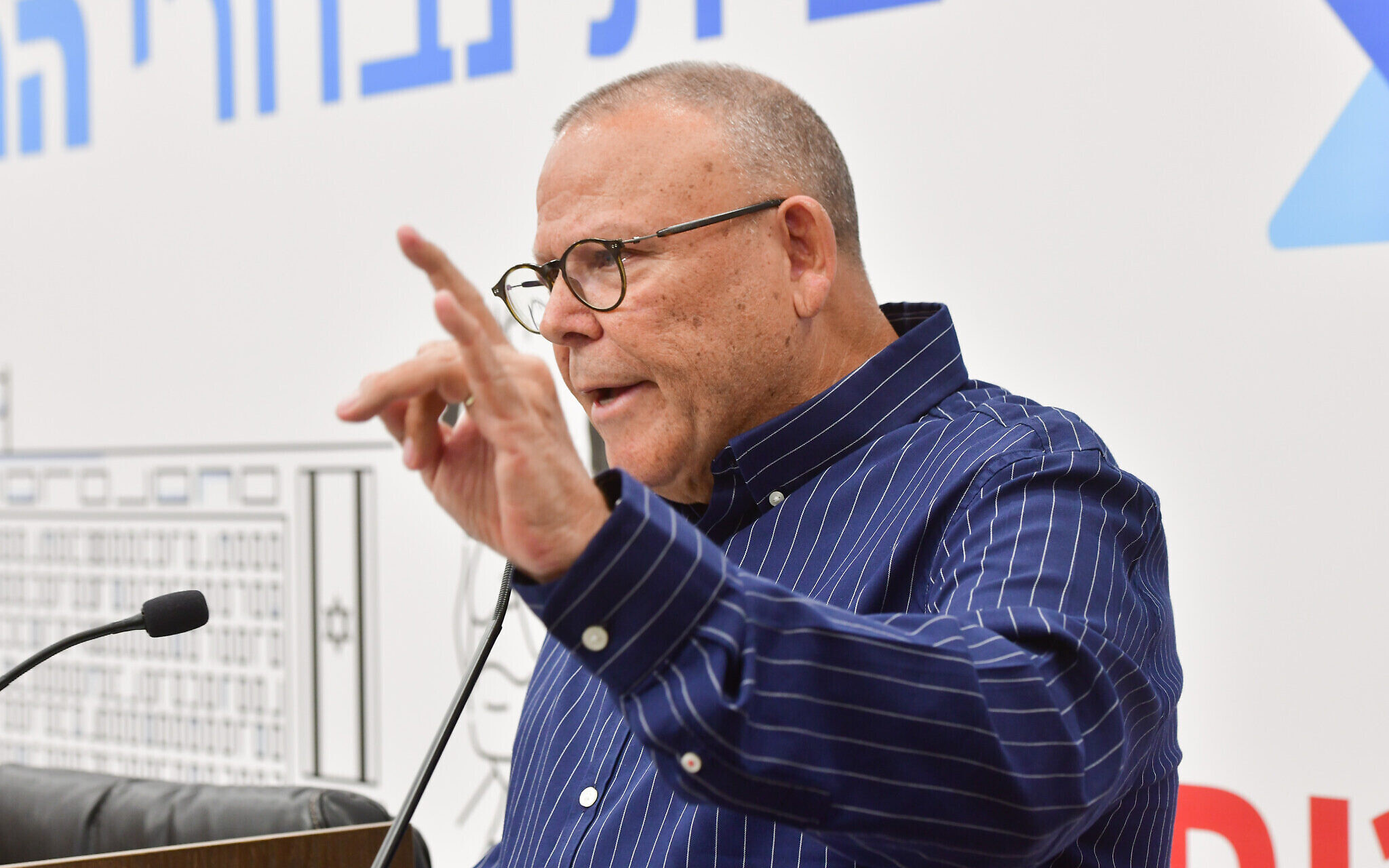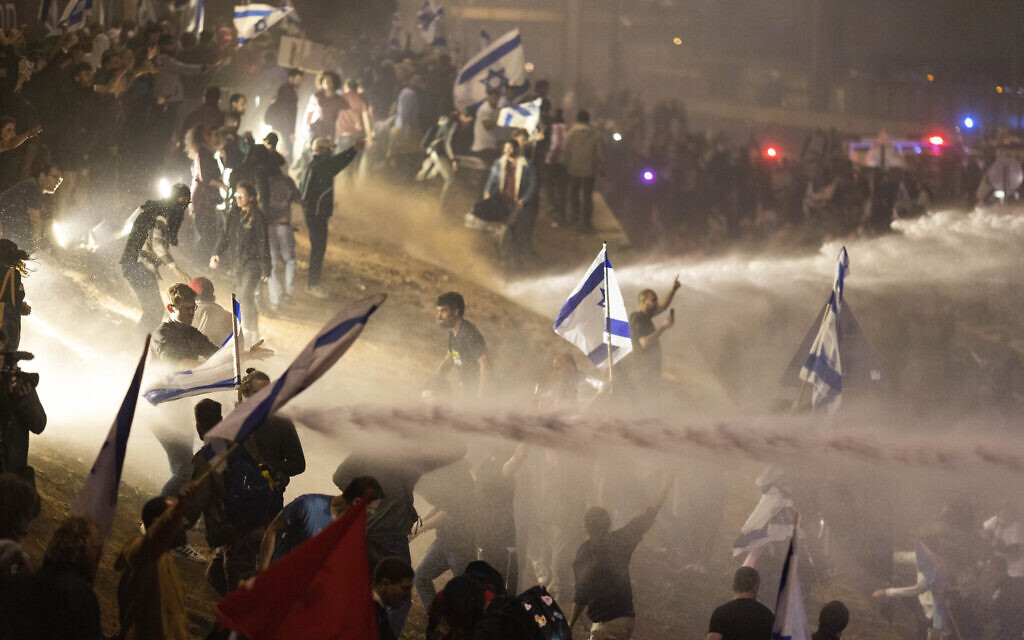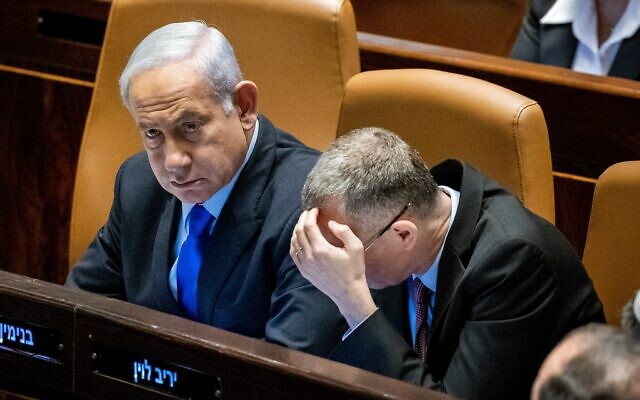ISRAEL
Rothman threatens ‘political’ response to labor federation’s strike against overhaul
Chair of Knesset law committee says nationwide shutdown organized by Histadrut was illegal, warns it to expect consequences
The far-right chair of the Knesset Constitution, Law and Justice Committee on Tuesday threatened the country’s main labor union after it called a strike in opposition to the government’s plans for the drastic overhaul of the judiciary.
MK Simcha Rothman, a key architect of the overhaul, told Army Radio that the strike organized Monday by the Histadrut labor federation was “illegal” because it was called for political purposes and said that it only harmed workers’ rights.
Rothman, of the Religious Zionism party, said that if someone makes use of their economic power or that of a workers’ organization for political purposes, “it should come as no surprise that action will be taken against him in the same way, for political reasons.”
Rothman, who did not clarify what such action might entail, also directed his remarks at businesses and companies that joined the strike.
The Histadrut called the strike Monday after Prime Minister Benjamin Netanyahu fired his defense minister Yoav Gallant for urging a halt to the government’s legislative blitz to politicize and constrain the judiciary. Firing Gallant prompted mass demonstrations across the country against the legislation, which has already faced weeks of protests attended by hundreds of thousands of people.
Following the strike declaration, flights out of the country’s main international gateway Ben Gurion Airport were halted for hours. Stores, companies, and banks across the country began to close their doors on Monday afternoon as they joined the strike. Tech companies shut their doors and restaurant chains such as McDonald’s and Aroma announced that they too would cease operations. Multiple hotel chains said they were also joining the strike, offering very limited services to guests.
Netanyahu later that evening announced that he was pausing the legislation to prevent “civil war” and enable dialogue with opposition parties on the matter, at which point the Histadrut immediately called off the strike.

Rothman told Army Radio he was not disappointed by Netanyahu’s move but nevertheless said he doesn’t think it was right to halt the legislation.
He said the government was being “responsible” by announcing the pause, while accusing the opposition of having acted “with extreme irresponsibility.”
Histadrut chair Arnon Bar-David had previously suggested the federation could take action if no compromise judicial reform deal was reached, but had until Monday refrained from involving the powerful union in the demonstrations against the far-reaching proposals to curb the judiciary. Historically, Histadrut strikes over public sector wages and conditions have had a profound impact on the country and its economy.
Last month, the Histadrut declined to take part in a “national day of struggle,” amid speculation that it was not looking for a fight with the new coalition before a new wage agreement could be finalized, with Bar-David repeatedly calling for compromise. A new wage deal was signed earlier this month.
The judicial changes will remove the Supreme Court’s ability to act as a check against the government by enabling parliament to overrule it and legislate laws even if the court strikes them down. The government will also gain control of the panel that selects court judges, among other far-reaching changes.

There have been weekly mass protests for nearly three months against the planned legislation, and a rising wave of objections by top public figures including the president, jurists and business leaders.
President Isaac Herzog has pleaded with the government to abandon its “oppressive” judicial overhaul and replace it with a framework for consensual reform.
Ben Gurion departures halted
as Histadrut declares ‘historic’
strike against overhaul
Union chief says labor action meant to ‘stop
the madness’ after Netanyahu’s firing of
defense minister; doctors, local authorities,
students and universities also strike
The head of the Histadrut labor federation on Monday declared a “historic” labor strike in an attempt to “stop the madness” of the government’s controversial judicial overhaul, ramping up demonstrations after Defense Minister Yoav Gallant was fired for speaking out against the planned changes.
As part of the labor action, workers at Ben Gurion Airport swiftly announced they would prevent departures. Other organizations also declared they were joining the strike.
“We are all worried about Israel’s fate,” Histadrut chief Arnon Bar-David said during a press conference alongside business leaders and public officials. “Together we say, enough!”
“We have lost our way — this is not about left or right,” he continued. “We can no longer polarize the nation.”
The announcement came ahead of an expected statement by Prime Minister Benjamin Netanyahu that he is freezing the legislation.
The union boss said he had done “everything” in recent weeks “to stop the situation,” but the efforts came to naught. “We are all joining hands to shut down the State of Israel,” Bar-David said. “The malls and the factories will close.”

The strike also includes the health sector, with the Israel Medical Association pledging its support.
Bar-David received a standing ovation at the end of his speech, which was punctured by cheers and chants of “democracy.” At the meeting of the press conference, participants sang the national anthem.
The press conference was announced after Bar-David sat down with business leaders for what was billed as an emergency meeting, with the Histadrut saying he had been “astonished” by Netanyahu’s decision to fire Gallant.
Video from protests along the Ayalon Highway overnight showed Bar-David chanting “strike” alongside protesters.
Bar-David previously suggested the Histadrut could take action if no compromise judicial reform deal was reached, but had until now refrained from involving the powerful union in the demonstrations against the far-reaching proposals to curb the judiciary. Historically, Histadrut strikes over public sector wages and conditions have had a profound impact on the country and its economy.
Last month, the labor federation declined to take part in a “national day of struggle,” amid speculation that it was not looking for a fight with the new coalition before a new wage agreement could be finalized, with Bar-David repeatedly calling for compromise. A new wage deal was signed earlier this month.
Shortly after Bar-David spoke, the workers union at Ben Gurion Airport was the first to take action, with its head announcing an immediate halt to departures.
“I ordered the immediate halt of takeoffs at the airport,” Pinchas Idan said in a statement, without giving further details.

The Federation of Local Authorities in Israel said it too would join the strike declared by the Histadrut.
“The rift in the nation and the tremendous chaos Israel is in have almost reached the point of no return,” Modiin Mayor Haim Bibas, a member of Netanyahu’s Likud party who heads the federation, said in a statement.
Bibas and the other mayors called for Netanyahu to immediately halt the overhaul legislation and restore Gallant as defense minister.
“The prime minister must chart a new course and arrive at immediate dialogue between the sides that will lead to broad agreement,” Bibas said.
While schools were set to go on Passover break, day camps and kindergartens will not open on Tuesday morning.
Meanwhile, stores, companies and banks across the country began to close their doors on Monday afternoon as they joined the strike.
Hospitals and the Israel Electric Corporation said they were operating on a reduced schedule.
The popular Terminal X online retail platform closed down operations, saying it was joining the strike and not taking new orders.
Tech companies shut their doors and restaurant chains such as McDonald’s and Aroma announced that they too would cease operations.
Multiple hotel chains said they would also join the strike, offering very limited services to guests.
Earlier, the National Student and Youth Council, representing high school and middle school students, declared a nationwide strike to start Monday morning.
The council called for “halting the [overhaul] legislation and immediately beginning negotiations.”
On Sunday evening, a group of universities also announced a strike beginning Monday.
“We, the heads of Israel’s research universities, presidents, rectors, and management, will stop studies in all of Israel’s research universities starting tomorrow morning, amid the continuation of the legislative process that undermines the foundations of Israeli democracy and endangers its continued existence,” the universities said in a statement.
“We call on the prime minister and the members of the coalition to stop the legislation immediately, and immediately enter talks in order to reach an agreed-upon and broad outline,” they added.

Separately, the mayors of Kfar Saba, Herzliya and Zichron Yaakov declared a hunger strike, along with the heads of the Upper Galilee and Shaar Hanegev regional councils.
The mayors and community leaders said they would strike in front of the Prime Minister’s Office in Jerusalem.
The actions came amid mass demonstrations across the country, as the government appeared to press on with the judicial overhaul following the ousting of Gallant.
The demonstrations, during which protesters blocked a major highway in Tel Aviv, lit bonfires and were hit by water cannons outside the Prime Minister’s Residence in Jerusalem, capped the first day of a planned weeklong series of rallies against the government.
As the spontaneous protests broke out Sunday night, the Knesset’s Constitution Committee was finalizing core legislation that will give the coalition near-complete control of choosing Israel’s judges. Committee chairman Simcha Rothman announced that discussion in the committee would resume at 8 a.m. Monday, with the bill scheduled to be presented for its final readings later Monday night in the Knesset plenum.

Opponents of the overhaul have drawn a line in the sand on the judicial appointments bill, saying it will politicize the court, remove key checks on governmental power and cause grievous harm to Israel’s democratic character.
Protest leaders on Friday announced the unprecedented nationwide “week of paralysis” aimed at upending daily life in the country, including mass protests in Tel Aviv and Jerusalem.
There have been weekly mass protests for nearly three months against the planned legislation, and a rising wave of objections by top public figures including the president, jurists, business leaders, and more.
President Isaac Herzog has pleaded with the government to abandon its “oppressive” judicial overhaul and replace it with a framework for consensual reform. But the sides have not entered any direct talks.










